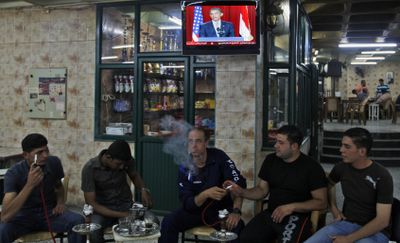Eloquent president stops short of specific

CAIRO, Egypt – He came with goodwill and eloquence, but the question kept echoing: Were they enough?
U.S. President Barack Obama’s long anticipated speech to the Muslim world Thursday sought to dissolve the mistrust between Islam and the West by highlighting his personal appeal as he called for an end to intolerance and violence and a move toward a shared future. It was a textured blend of history, the president’s experience with Islam and the need to quell religious extremism.
The 55-minute address at Cairo University was short on policy details. What it lacked in specificity the speech made up for by linking Obama’s story – the Christian son of an African-Muslim father – with his administration’s goals of ending the Arab-Israeli crisis, coaxing Iran toward the negotiating table and calling on Muslims to reject the fanatical voices of Osama bin Laden and others.
The words were a start, but the question here remains: Is Obama genuinely the face of change in U.S. foreign policy, or will he merely offer a sparkle of promise before he is overwhelmed by troubles from the bombed alleys of the Gaza Strip to the mountains of Afghanistan?
The address did not answer that; it didn’t provide enough concrete solutions to wipe away doubt. It did suggest, however, that the president was a conciliator, not a warrior, and that America, especially in Iraq, had made mistakes. Saving face is a cherished Arab virtue, and a man who can keep his face while listing his mistakes is respected.
But Obama, with an eye to how his remarks would play among conservatives in Washington, said the U.S. would “relentlessly confront” extremists and urged Islam to tame its violent minority and set aside the “crude stereotype” of America.
The president was attempting to insinuate himself into the larger debate within Islam – not among jihadists, who won’t be swayed by appeals from an American president, but between mainstream conservative and moderate Muslim voices looking to keep their faith but also engage the secular West.
“No single speech can eradicate years of mistrust, nor can I answer in the time that I have all the complex questions that brought us to this point,” Obama said. “There must be a sustained effort to listen to each other, to learn from each other, to respect one another and to seek common ground.”
That was the message. It was bolstered by woven-in quotes from the Quran and by the president’s greeting to the crowd: “assalamu alaykum,” or “peace be upon you.” The speech was delivered the way you introduce yourself here to neighbors as a newcomer to town: explaining where you’re from, your passions, but not delving too deeply into prickly topics. That unveiling comes later.
Obama spoke fervently about the creation of a Palestinian state, while also stressing that the U.S.-Israeli bond is unbreakable. This was the topic many Arab Muslims waited for, and Obama, as in much of the speech, turned to history: how it resonated, but also how the world must not be bound by it.
He said denying the existence of the Holocaust, as some of Israel’s enemies have done, is “baseless, it is ignorant and it is hateful.” But he noted that “it is also undeniable” that the Palestinians have suffered pain and indignities in their quest for a homeland. He again firmly called for a halt to the expansion of Israeli settlements in the West Bank, but he said Palestinians should follow the course of nonviolent protest.
The tenor of his address was not to point blame – except at extremists – but to end animosities between Islam and the West. “We have the power to make the world we seek,” he said, “but only if we have the courage to make a new beginning, keeping in mind what has been written.”
He then quoted from the Quran, the Talmud and the Bible.
But Obama will need to recite more than holy text to convince his audience that his words will be followed by change.